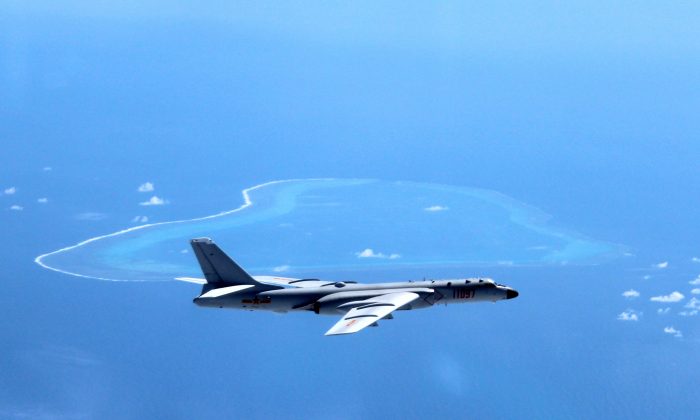Court Challenge of Newfoundland and Labrador’s COVID-19 Travel Ban Begins
Prime Minister Scott Morrison has signalled that Australia will not be “passive” against Beijing’s destabilising actions in the Indo-Pacific as the communist regime engages in “crude economic or political coercion.”
Australia is also working to rebuild the international order in an attempt to strategically balance global competition in the immediate region.
Delivering an address at the Aspen Security Forum on August 3 Morrison noted that the Indo-Pacific had become the “epicentre for strategic competition.”
Listing the tensions around territorial claims, growing threats from foreign interference, cyber-warfare, and economic coercion, Morrison said: “It’s fair to say that in 2020, our ‘international society’ is under strain.”
 Australian Prime Minister Scott Morrison speaks during a media conference at Parliament House in Canberra, Australia on July 9, 2020. (David Gray/Getty Images)
Australian Prime Minister Scott Morrison speaks during a media conference at Parliament House in Canberra, Australia on July 9, 2020. (David Gray/Getty Images)“The configuration of power in global politics has changed,” said Morrison, and Australia needs to “deal with the world as it is, not as we’d like it to be.”
The prime minister said Australia will not be a bystander in this new world order and will deploy “all elements of statecraft to shape the world we want to see.”
“We will call it as we see it,” he said.
China and the United States Need to Uphold a Common Set of Rules
Singling out China, Morrison said Australia welcomed China’s economic rise but that “global expectations of China are now higher,” and China must accept that it has a responsibility to enhance and maintain global stability.
China needs to stop pursuing a “narrow national or aspirational interest” and instead consider the “broader global and regional interest,” the prime minister said.
The United States has always been held to such a standard, as it is a major stabilising factor in the Indo-Pacific region, and its continued focus and engagement in the region was vital to the world.
“China and the United States have a special responsibility to uphold ‘the common set of rules’ that build an international society,” Morrison said.
 Australian beef is seen at a supermarket in Beijing on May 12, 2020. (Greg Baker/AFP via Getty Images)
Australian beef is seen at a supermarket in Beijing on May 12, 2020. (Greg Baker/AFP via Getty Images)The federal government has recently pivoted Australia’s strategic defence and foreign relations focus on security in the Indo-Pacific region. Currently, Australia is working with its allies in the region including India, Vietnam, Japan, and Indonesia to ward off Beijing’s aggressive expansionist activities in the region, as reported by AAP on August 5.
In recent months the government has also moved swiftly to counter cybersecurity attacks on the nation’s institutions and called out disinformation campaigns from Beijing, Moscow, and Turkey. Beijing has also instigated a long-running trade dispute with Australia slapping tariffs on barley imports and banning beef from local abattoirs.
The prime minister said that in the face of these challenges Australia was “not being passive.”
“Knowing is not enough; we must apply. Being willing is not enough; we must do. Now, we are doing in Australia,” he said.
He pointed to the July 1 announcement of a new Strategic Update which would see the country invest a record $270 billion (US$187 billion) into the Australian Defence Force (ADF) over the next ten years, effectively pushing Australia’s defence spending past 2 percent of the country’s GDP.
Morrison said: “Australia already spends more on our defence than most of the United States’ alliance partners.”
 Royal Australian Navy warship HMAS Paramatta sails in front of the iconic Sydney Opera House on Oct. 4, 2013. (Saeed Khan/AFP/Getty Images)
Royal Australian Navy warship HMAS Paramatta sails in front of the iconic Sydney Opera House on Oct. 4, 2013. (Saeed Khan/AFP/Getty Images)“Two percent of our GDP is no longer a target; it is a floor for us, and we will spend even more … We pull our weight,” said the prime minister.
In 2019, several major economies in the Indo-Pacific region had defence budgets which fell below the 2 percent mark, including Japan (0.93 percent), New Zealand (1.5 percent), and Canada (1.31 percent).
The prime minister also outlined recent efforts to build trade partnerships with “like-minded” nations including India, Japan, and Vietnam, as well as strengthening existing relationships.
“Australia is resolutely committed to our Five-Eyes partnership, and our ever‑closer ties with our friends in Europe,” he said.
“We look to, and share a belief in, the values and institutions that the United States has championed,” Morrison said. “We respect each other as equal partners with the United States. We do our fair share of the heavy lifting. We’ve got each other’s back.”
Speaking on Sky News on August 5, Shadow Foreign Minister Penny Wong agreed with the prime minister that Australia needs to generate the sort of region that is “not only stable and prosperous, but in which sovereignty is respected.”
However, she said that Australia needs to be aware of not just “a more assertive, more nationalistic China, but also a U.S. administration which is behaving differently to the way in which we have become accustomed to America behaving in the region.”
Wong criticised the prime minister, saying he needed to do more to assist the region, saying there had been an absence of leadership from the government when it comes to the Indo-Pacific.
Focus News: Australia Will Not Be ‘Passive’ Against Coercion and Destabilising Forces in the Indo-Pacific: PM
